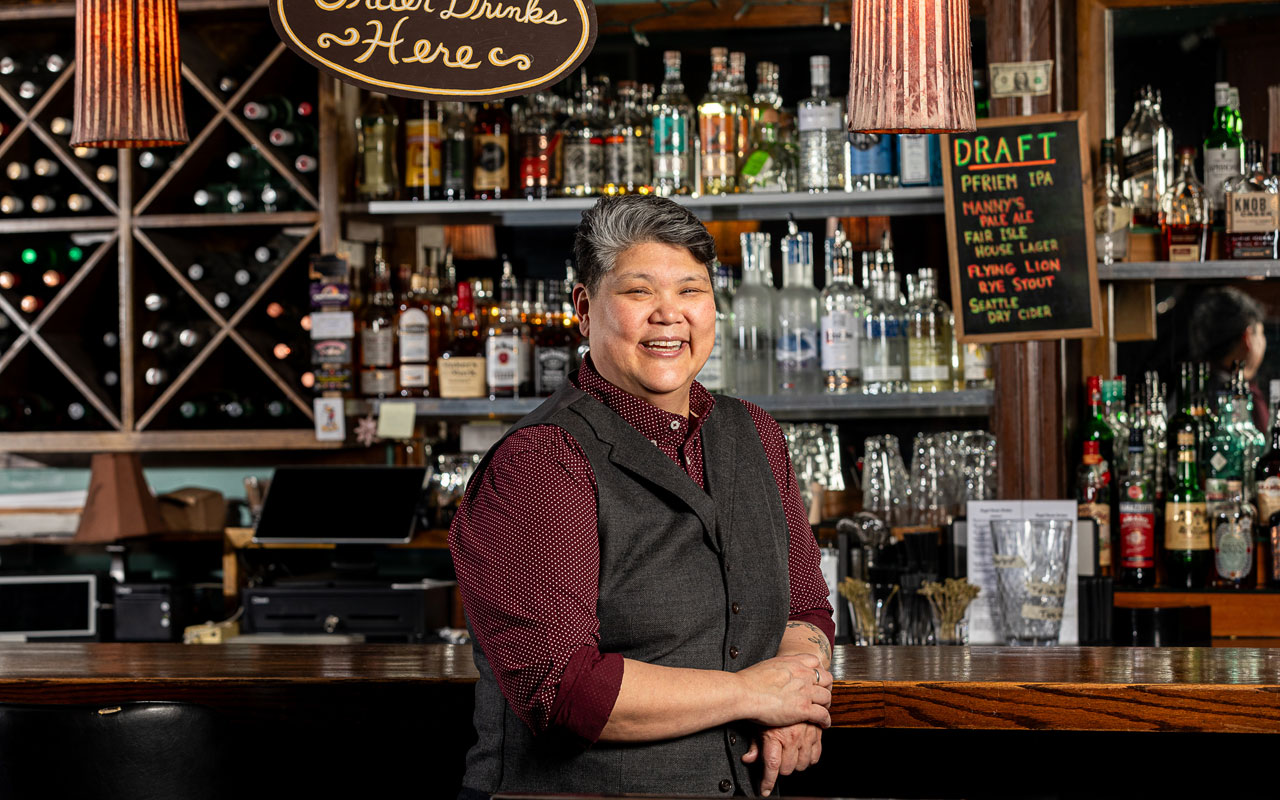
Reese Tanimura photo by Daniel Sheehan
For regular Earshot Jazz readers, The Royal Room needs no introduction. Located in the heart of Columbia City, the intimately sized venue, bar and restaurant has been one of Seattle’s premier spaces for live jazz since it was opened by Tia Matthies, Steve Freeborn, and Wayne Horvitz in 2011. The founding partners envisioned their new space as an incubator for the local arts scene that could embrace all genres and welcome the experimental. Thirteen years of unforgettable performances later, they have decided to pass the reins.
Reese Tanimura, who already helps shape the Seattle music world as Managing Director of Northwest Folklife, officially picked up the torch as The Royal Room’s new owner in early February. Tanimura is a fourth-generation Japanese American who grew up in Hawaii and Illinois before moving to Seattle in 2007. She is a lifelong musician who started out on ukelele before adopting French horn, guitar, and other instruments. She has spent many years teaching music and directs the Rain City Jazz Orchestra, an all-female and non-binary big band.
Tanimura originally began discussing entering The Royal Room partnership all the way back in 2019. The conversation was placed on hold by the pandemic, and by the time it resumed, the founding partners were ready to take a step back from ownership. The turnkey transition was completed with a celebratory performance of classic swing on New Year’s Eve.
Having curated and attended performances at The Royal Room for many years herself, Tanimura isn’t planning any major changes – aside from introducing some delicious Asian and Pacific Island cuisine to the menu, that is. Dedicated regulars will be relieved to hear that the atmosphere and business model will continue as before. Most of the venue’s existing staff have stayed on board, and Horvitz’s South Hudson Music Project non-profit will continue to play a central role in presenting performances. Signature programming such as Piano Starts Here, The Royal Room Collective Music Ensemble, and Tanimura’s own Womxn in Blues series will remain on the schedule, along with countless other beloved artists and events.
While Tanimura knew what she was getting into, she is admittedly enjoying the surprising twists and turns that the venue’s adventurous schedule and open-minded audiences invite. “I had this group called Genghis Barbie,” she recounts, “one of the founders is a Garfield alumnus. They’re a French horn quartet that also sings – which is pretty unusual. We had a full house, and there was a moment where they were transitioning from singing back into playing, and it was just really quiet. The cool thing about it was that it didn’t seem out of the norm. It’s really cool to see how open people are to the kinds of possibilities there are in the musical repertoire.”
Moving forward, Tanimura’s planned contributions look less like an overhaul and more like an expansion of The Royal Room’s existing approach, network and community. Connecting the venue’s resources with the queer, Asian, Black, and Brown voices that have shaped her life in Seattle and elsewhere is a top priority. “It gives me the chance to bring community that has been really integral to me into a space that they might not have interacted with as much,” she says.
Tanimura is also eager to keep a close watch on the opportunities that The Royal Room can provide for young people. She is determined to utilize the space for fostering an intergenerational sense of community like the ones that have always nurtured great musicians in their early years. Welcoming musicians and fans of all ages is critical to her vision, even as it presents legal obstacles for a venue that sells alcohol and must abide by the according state regulations.
Whether discussing artists, audiences, spaces or communities, Tanimura repeatedly returns to the word ecosystem as a tool for illustrating the musical landscape from her perspective. As the new owner of an established venue, her goal is to tap into the pockets and corners of this ecosystem and provide a platform for the voices that make Seattle’s artistic environment so compelling. “[At Folklife], each of our programming team members works with 25 community coordinators to pull in the best of those communities and make sure those voices are right there at the table. I think it’s an important model, so we’re gonna see how we can make it work in a ‘non-non-profit’ setting”, she says with a laugh.
As a Columbia City resident for nearly 20 years, Tanimura is no stranger to living this philosophy in the South End. “I just love it down here,” she says. “There are some excellent businesses, but the people behind those businesses are just excellent human beings. So, to be joining their community is very exciting and special to me.” Events like the Columbia City Beatwalk have inspired her sense of how businesses in the neighborhood can work together.
The Royal Esquire Club, the Black social club located next door, presents a perfect opportunity for community-driven partnership. The Esquire owns the building and blessed The Royal Room with its name when it previously operated as an extension of their own business. Another expected collaborator is found just a half mile down the road in Hillman City. Violinist Benjamin Hunter, who co-pilots Folklife with Tanimura as Artistic Director, co-founded Black & Tan Hall at 5068 Rainier Avenue in 2016, and successfully opened it as a collectively operated performance space and community hub in 2021.
With the changing of the guard complete, the colorful flyers decorating the front window confirm that The Royal Room hasn’t missed a beat. Inside, Tanimura is warm and focused as she discusses plans for the seasons to come. “This venue and my stewardship of it is about community, and I wouldn’t be here if there weren’t some amazing folks who supported me,” she explains. “Despite everything happening, I think there is a lot of opportunity, so I’ve got my eye on that prize.”